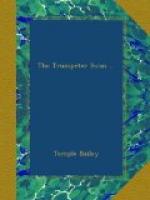“I’m glad he couldn’t.”
“Why?”
“I’m not sure that he’s—our kind——”
“Nonsense, he’s a very fine fellow.”
“How do you know?”
“Well, I know this,” testily, “that I am not to be instructed as to the sort of person I can ask to my house.”
“Oh, Father, I didn’t mean that. Of course you can do as you please.”
“Of course I shall, Claudia.”
“I think he is charming,” said Mrs. Paine. “He has lovely eyes.”
“Hasn’t he?” said little Becky.
CHAPTER III
THE WOLF IN THE FOREST
I
The Bird Room at Judge Bannister’s was back of the library. It was a big room lined with glass cases. There hung about it always the faint odor of preservatives. The Trumpeter Swan had a case to himself over the mantel. He had been rather stiffly posed on a bed of artificial moss, but nothing could spoil the beauty of him—the white of his plumage, the elegance of his lines. He was one of a dying race—the descendants of the men who had once killed for food had killed later to gratify the vanity of women who must have swans down to set off their beauty, puffs to powder their noses. No more did great flocks wing an exalted flight, high in the heavens, or rest like a blanket of snow on river banks. The old kings were dead—the glassy eyes of the Trumpeter looked out upon a world which knew his kind no more.
In the other cases were the little birds and big ones—ducks, swimming on crystal pools, canvas-backs and redheads, mallards and teal; Bob-whites, single and in coveys; sandpipers, tip-ups and peeps, those little ghosts of the seashore, shadows on the sand; there were soar and other rails, robins and blackbirds, larks and sparrows, wild turkeys and wild geese, all the toll which the hunter takes from field and stream and forest.
It was in a sense a tragic room, but it had never seemed that to Becky. She came of a race of men who had hunted from instinct but with a sense of honor. The Judge and those of his kind hated wanton killing. Their guns would never have swept away the feathered tribes of tree and sky. It was the trappers and the pot-hunters who had done that. There had motored once to the Judge’s mansion a man and his wife who had raged at the brutes who hunted for sport. They had worn fur coats and there had been a bird’s breast on the woman’s hat.
The Judge, holding on to his temper, had exploded finally. “If you were consistent,” he had flung at them, “you would not be decked in the bodies of birds and beasts.”
Becky loved the birds in the glass cases, the peeps and the tip-ups, the old owl who did not belong among the game birds, but who, with the great eagle with the outstretched wings, had been admitted because they had been shot within the environs of the estate. She loved the little nests of tinted eggs, the ducks on the crystal pools.




